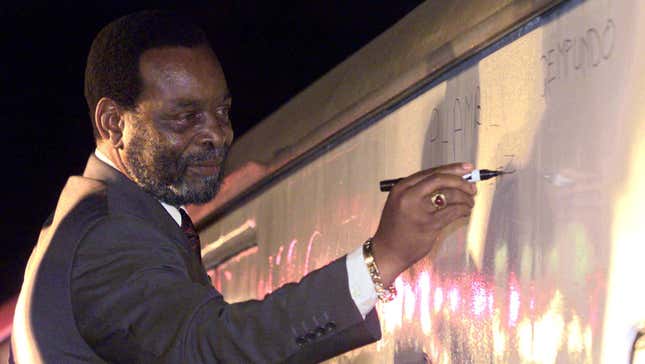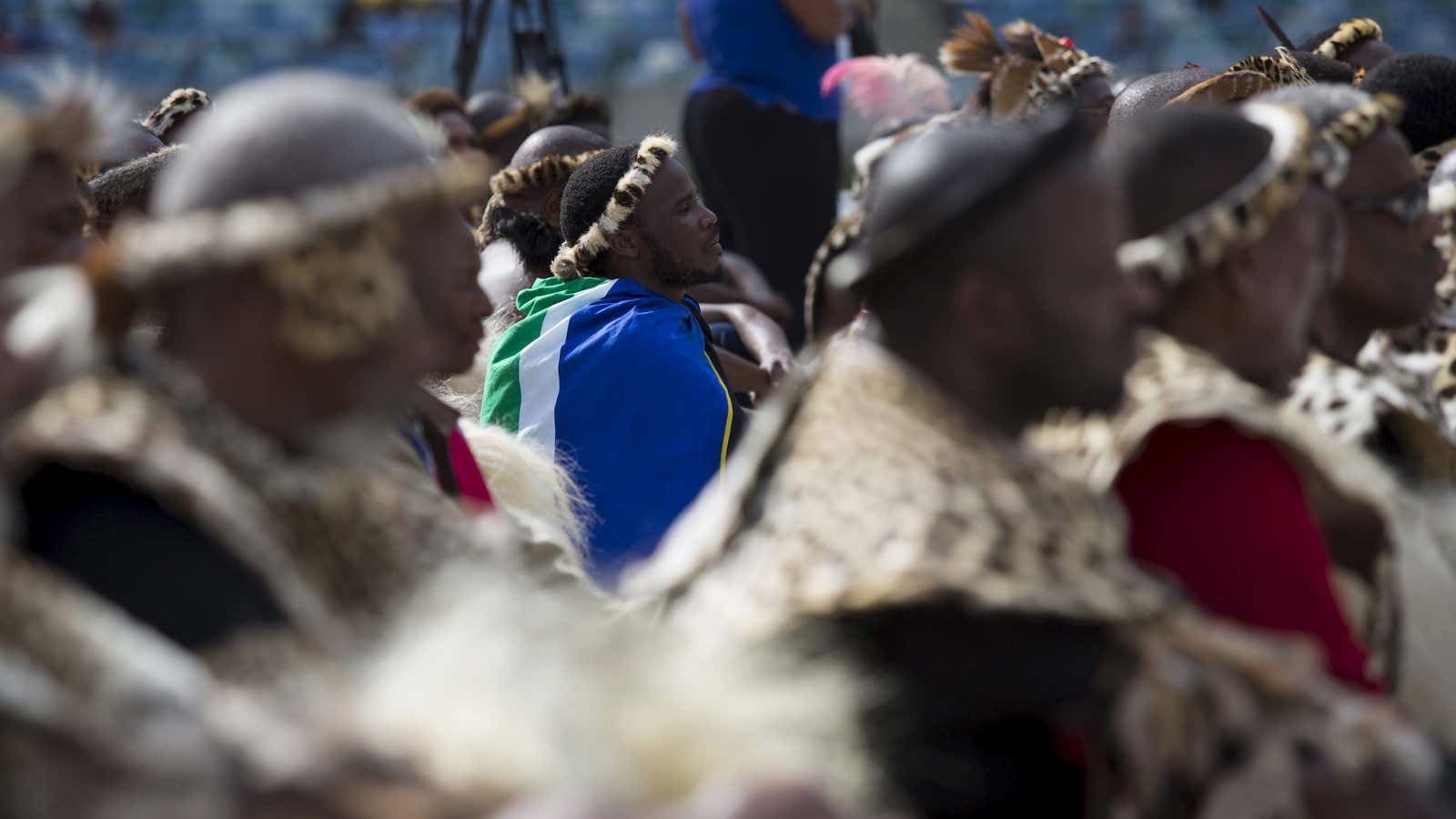The Zulu dynasty has almost been felled numerous times by trials, trysts and tragedies, but has stood steady through the centuries. The largest ethnic group and nation in South Africa today, counting in excess of 10 million people, the Zulus have a family tree with roots stretching as far back as the migration of the Bantu people from their origins in West Africa throughout the continent several hundred years ago.
They now face a challenge that threatens their growth and relevance. The late King Goodwill Zwelithini, who was laid to rest this week after serving for almost 50 years, leaves a legacy that is admirable, but not replicable.
King Zwelithini, a descendant of Shaka Zulu, was the Zulu kingdom’s eighth monarch and a political and cultural figurehead in South Africa. He became king in 1968, a time where South Africa’s tribal factions were being aggravated by apartheid-era legislation. He played a leading role in uniting the Zulus across the political divides, and later spearheaded the revival of cultural practices such as the Reed Dance and male circumcision.
Fast forward to 50 years later, and his successor will be inheriting a significantly different Zulu nation. His heir will be chosen by the family and advisors from amongst his 28 children.
The new leader will have to appeal to a people who, because of urbanization and globalization, may no longer center their identity around being Zulu, choosing rather to be multicultural. Some Zulus prioritize a national identity of being South African over the tribal identity of being Zulu. And others may have little interest in revering cultural practices that they consider patriarchal or outdated. King Zwelithini’s successor will need to be a leader with one foot in the shadow of his ancestors; and the other planted firmly in the light of tomorrow.

Political broker
With South Africa’s next national elections set for 2024, the new Zulu king will maneuver through tricky political terrain quite early in his reign. He will have a prime opportunity to demonstrate the value of a politically impartial monarchy as an emissary of peace. This is particularly significant in the kingdom’s home province of KwaZulu-Natal (KZN), which has seen decades of simmering tensions between the ANC and IFP political parties, who both have deep roots in the province, and therefore compete for votes.
The role of a king is largely ceremonial. It is not, however, without influence. In order to harness and wield this prominence, the king’s successor will need to consider utilizing modern methods of communication such as Twitter and YouTube. Currently, the Zulu monarchy has no official social media accounts.
Globally, elections are increasingly being won or lost online, and conflict is incited or impeded by digital warriors fighting on their keyboards. If the traditional empire is to have continued significance, it must have a positive voice in both the physical and virtual realms.
Mapi Mhlangu, the managing director of MInsight Content Creation, who was born in KwaZulu-Natal, believes the Zulu monarchy can also offer a safe space for the marginalized and disillusioned. “In a society where there is so much othering of identity and where politics can be polarizing, monarchs offer non-partisan leadership and a sense of belonging for people who often deal with constant rejection from other political systems,” Mhlangu says. This could be particularly helpful for people who may have different political affiliations to their families, or those who can’t find a political party that best represents their interests.
Remembering that he can reign, but not rule, will be important for the new king, who himself is bound to the laws of the country—even when culture or history may differ from government policies.
King Zwelithini was reminded of this in 2012. At an event commemorating the Battle of Isandlawana, he sparked controversy with a statement that same-sex relations are “wrong,” “rotten,” and not part of Zulu tradition. (South Africa legalized same sex marriage in 2006.) Following condemnation from then President Jacob Zuma, the South African Human Rights Commission, and LGBT rights groups, the Zulu Royal Household walked back his comments.
Custodian of Zulu culture
As the authority on ritual matters, King Zwelithini has been both praised and criticized for supporting Zulu nationalism.
His sentiments in 2015 that foreigners should not compete with locals for scarce economic opportunities were denounced as being xenophobic and contributory to violence against non-nationals.
This strong sense of ethnic pride has however fostered unity in KwaZulu-Natal and in Zulu communities across the country.
Farmer and social entrepreneur Paul Ndlovu was born in KwaNongoma, a town in KZN where the Zulu household lives. He is thankful that King Zwelithini revived old cultural practices such as Umkhosi woMhlanga, or “The Reed Dance.” The annual event celebrates and unifies the Zulu nation, while also honoring virgin maidens.
This renaissance however, wasn’t just a fun celebration for young men and women, it also aimed to reduce teen pregnancy and HIV infection by promoting abstinence and encouraging men to get circumcised. The medical procedure has been shown to reduce the transmission of HIV, which is prevalent in South Africa.
“In collaboration with the Department of Health, the King pushed the idea for all Zulu men to get circumcised,” Ndlovu says. “I remember very well in my teens, my friends and I all pushed each other to do it. We even arranged to go in groups to the hospitals to get circumcised. Many of us heeded the call.”
At the 2004 Reed Dance, the King delivered a rousing speech about holding onto Zulu heritage. “While some aspects of our lives have changed, as Africans, we should not distance ourselves from our culture and take on the cultures and traditions of other nations,” he said.
Today’s day and age is vastly different from when the King spoke these words.
Practises such as the virginity testing of young girls which takes place at the Reed Dance may no longer be as relevant in a society that is advocating sexual liberation and independence for women.
Consequently, says Ndlovu, the king incumbent will need to promote culture not just as a way of remembering the past, but as a tool to shape the future. In this way, the Zulu nation can support its people by cultivating a culture of education, sports, farming and other skills-based traits.
“We need a King that will establish an educational trust for his people. It’s no secret that rural KZN schools don’t do well, so we need a king who will be passionate about school and university,” Ndlovu says. “We need a king who understands that sports is very important for the well being of people. Establishing a new sports initiative that could be called the Kings Games would encourage people to exercise, and maybe motivate them with the opportunity to actually meet the king.”
Other ways to celebrate Zulu heritage can be with a commitment to theater and the arts that tell the stories of legends; culinary festivals to celebrate indigenous foods and crops native to KZN, and investment in Zulu language TV and radio shows in currently overlooked genres such as sci-fi, animation and fantasy.
Self-described “farm boy” and CEO of Erens Capital Group, Thapelo Lekala from Mpumalanga province believes that the monarchy can be a modern and necessary institution if it prioritizes economic emancipation. “The new king must ensure his people have access to land for agricultural purposes,” he says. “He must also partner with the government and with the private and non-governmental sectors, to create entrepreneurship and employment opportunities for everyone, but especially those in rural communities.”
With an ever-widening income inequality gap in South Africa and particularly pressing needs in KZN, the new king could change the trajectory of the Zulu kingdom by keeping people connected to their roots, while charting a path forward.
Sign up to the Quartz Africa Weekly Brief here for news and analysis on African business, tech, and innovation in your inbox.
